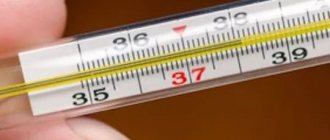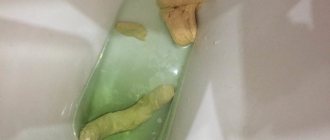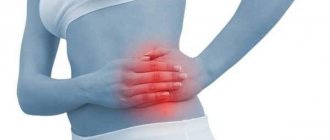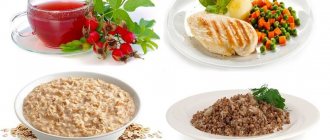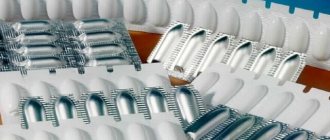Every person experiences hiccups. Usually it does not last long, occurs infrequently, and goes away on its own. Nobody pays much attention to it, unless a person finds himself in a crowded place and begins to attract the attention of others.
Sometimes I have hiccups all day long. This should be a reason to see a doctor. Because such a situation signals serious problems and pathologies in the body.
How do hiccups appear?
Usually, air leaves the respiratory tract smoothly, but sometimes, under the influence of some factors, it begins to be pushed out in jerks. At the same time, the chest contracts convulsively.
This process is called hiccups and occurs due to irritation of the diaphragm. The diaphragm is a muscle that is controlled by the autonomic nervous system. It delimits the abdominal cavity and the chest.
The vagus nerve, which is a pair of mixed cranial nerves, runs inside the diaphragm. This nerve runs from the skull down to the center of the abdominal cavity through the esophagus, serving to connect the internal organs and the central nervous system. If any irritants enter the esophagus, the vagus nerve is injured and begins to contract.
Hiccups occur in the form of several convulsive breaths with pauses between them. In the middle of inhalation, the glottis closes, the person makes a loud involuntary sound from the throat, and the body shudders. It is believed that this is the body’s protection from some external irritants.
Drug treatment for hiccups
As a rule, stopping such attacks is quite possible through conservative measures.
Drug therapy may include the following drugs:
- antacids;
- prokinetics;
- antispasmodics;
- sorbents;
- antibiotics;
- anti-inflammatory;
- to improve gastric motility;
- defoamers;
- proton pump inhibitors.
The list of necessary medications, dosage and regimen is determined by the doctor exclusively on an individual basis. You cannot take any medications on your own on an ongoing basis. Such actions can lead to extremely negative consequences.
In addition to taking medications, you must adhere to general recommendations, which are also suitable as prevention:
- eating food should be timely, unhurried, with thorough chewing;
- You can’t wash down your food, especially with carbonated drinks;
- the diet should be balanced, that is, containing all the necessary vitamins and minerals.
It is also very important to understand that feeling unwell is a reason to seek medical help, and not to self-medicate without an accurate diagnosis.
You can stop attacks of hiccups after eating with the help of some actions based on stimulating the pharyngeal receptors and reducing the activity of the vagus nerve:
- several swallowing movements should be made in a row;
- swallow a piece of ice or a slice of bread;
- hold your breath for a while;
- close your eyes and massage them;
- do physical exercise (squats, abdominal crunches or push-ups);
- drink water in small sips at a moderate pace, while bending your torso forward;
- eat an acidic product (a few drops of vinegar diluted in water, grapefruit or lemon juice);
- press on the far part of the tongue, provoking a gag reflex.
If these methods do not help, the doctor prescribes drug treatment, including antiemetics, receptor blockers, and medications to normalize acidity in the stomach.
Detection of an excess of carbon dioxide in the patient’s blood requires the prescription of medications that weaken the muscles of the esophageal valve. If there are any pathological abnormalities, the course of treatment is aimed at stopping the disease that causes hiccups after eating.
In case of low effectiveness of medications, the attending physician may resort to a blockade or section of the diaphragm nerves.
The drug treatment regimen for prolonged hiccups depends on the cause that caused it. Neurological reasons not related to surgery suggest the prescription of antipsychotics and treatment of the underlying disease.
In some cases, drugs are used to relieve muscle spasms of various etiologies - muscle relaxants.
To get rid of unexpectedly appearing hiccups, a person needs to immediately turn to one of the simple methods:
- Make 5-10 movements simulating swallowing food.
- Hold your breath for 20-30 seconds.
- Eat a cube of refined sugar.
- Carbon dioxide inhalation. You need to exhale air into a paper or plastic bag, then inhale it.
- Sneeze. To provoke the reflex, you need to tickle your nose with a feather, lubricate the mucous membrane with toilet soap, and smell ground black pepper.
- Breathe using your abdominal muscles, not your chest.
If the above methods do not help, you need to consult a doctor. The doctor will prescribe medications to eliminate hiccups:
- Metoclopramide or Cerucal;
- Atropine, Scopolamine;
- Haloperidol, Aminazine;
- Motilium (Domperidone);
- Ranitidine, Bromocriptine, Amitriptyline;
- Carbamazepine, Finlepsin, Diphenin;
- Nifedipine.
Dosages and regimen are selected by the therapist. Unauthorized prescription and treatment is not recommended. To reduce the harm caused to the stomach, tablets are taken after meals.
Sometimes medications do not have the desired effect. Then doctors resort to the last two methods:
- Epidural block in the cervical spinal cord.
- Novocaine blockade of the phrenic nerve or its dissection.
A blockade is a procedure in which a local anesthetic is injected into the source of pain (in the case of hiccups, pinching of the vagus or phrenic nerves): novocaine or lidocaine mixed with adrenaline. Due to loss of sensitivity, involuntary muscle contractions stop.
https://youtu.be/y7jWgM0uKr8
Reasons for appearance
It usually appears for the following reasons:
- violation of nutrition rules: overeating, hasty absorption of food, dry food;
- hunger, thirst;
- consumption of alcoholic and carbonated drinks;
- uncomfortable body position for a long time;
- stressful situations, fear, excitement;
- cooling the body, especially in young children.
We recommend reading: Why hiccups start immediately after eating
The problem caused by these reasons goes away in 5-25 minutes, very rarely lasts several days.
Carrying out diagnostics
Diagnosis that identifies the causes of pathological attacks of hiccups includes a series of examinations and several types of tests.
Analyzes
- To determine serum electrolytes and trace element content;
- Detection of kidney damage by determining blood urea nitrogen and creatinine;
- Determination of blood sugar levels.
Research
- X-ray examination of the chest to detect damage to the vagus and phrenic nerves;
- ECG;
- Conducting an endoscopic examination of the throat, upper gastrointestinal tract and esophagus;
- X-ray revealing the presence of an obstacle with the obligatory intake of a barium mixture;
- Determination of acidity level.
MRI of the brain and computed tomography of the chest are also indicated.
If, as a result of a diagnostic examination, any diseases were identified, one of the symptoms of which is hiccups, treatment is prescribed, as a result of which this symptom disappears.
How to get rid
People use many ways to help if hiccups do not go away:
- Holding your breath. It is enough to hold your breath for a few moments while inhaling. Repeat several times.
- If you suffer from hiccups all day, you should drink a glass of water in small sips. Or drink water from a glass, leaning forward, but not tilting the glass towards you.
- Induce vomiting.
- Sneezing. Black pepper can be used to induce sneezing.
- Changing your posture can help if your body has been in an uncomfortable position for a long time.
- A slice of lemon or sugar. An unusual taste in your mouth will help you cope with the situation.
Mustard and vinegar are often used. This is a very unpleasant, but quite effective mixture, if you have hiccups all day long, no other means help.
Massaging certain areas can also be effective if a person hiccups all day:
- Massage the eyeballs with soft circular movements.
- Perform a circular massage of the abdomen in the intestinal area.
- Press on the ears for 1 minute, rub the ears with your hands.
Among some Native American peoples, if a child suffers from hiccups all day, they tie a red thread or ribbon on his head at the level of the bridge of his nose. This method usually helps to cope with the situation. Maybe the fact is that the child is distracted, trying to squint his eyes at the red tape, the problem disappears.
Sometimes heart medications, for example, Valocordin, Validol, can help. Ice is considered a good remedy. A piece of ice is placed on the tongue or diaphragm area. You can add ice to the water.
Why do adults get hiccups?
There are two types of hiccups: episodic (one-time) and long-term.
The duration of an attack of the first type is less than 3 minutes. Appears:
- After or during meals. Poorly chewed food quickly passing through the esophagus causes it to fluctuate. This provokes the nerve located near the organ (vagus) to take measures to eliminate the discomfort. Excess food stretches the stomach, the organ begins to put pressure on the diaphragm, which the phrenic nerve also considers a deviation from the norm. In other words, if a person hiccups after eating, there is nothing unusual in the phenomenon.
- Hypothermia. Occurs when drinking cold drinks or low ambient temperatures. A newborn reacts more strongly to this cause than an older child.
- Emotional experiences (nervous tic).
Prolonged hiccups bother the patient for several hours or days. Occurs for more serious reasons than a one-time occurrence:
- Disruptions in the functioning of the central nervous system, provoked by injuries of the brain and spinal cord of a traumatic nature (TBI, spinal fractures, pinched roots and processes); stroke (bleeding in the brain); hereditary malformations of cerebral vessels (arteriovenous malformations); developmental disorders of the craniovertebral region of the brain (base of the skull, 1st and 2nd cervical vertebrae). Accompanied by compression of the cerebellum, medulla oblongata, and spinal cord located in the cervical vertebrae.
- Severe intoxication due to metabolic disorders caused by chronic failure of the pancreas, liver, and kidneys.
- Diseases that cause enlargement of organs located in the chest and neck: neoplasms and inflammation of the thyroid gland, esophagus, lungs, laryngobronchitis, heart attack, mediastinitis.
- If a symptom appears after every meal, it means that a person suffers from pathologies of the digestive system: peptic ulcer of the stomach and duodenum, gastrostasis, intestinal obstruction, liver disease, neoplasms in the stomach and pancreas, pancreatitis.
- Meningoencephalitis.
- Poisoning with ethyl alcohol, muscle relaxants, barbiturates.
Hiccups last all day: diagnosis
If hiccups do not go away for a long time, several days or weeks, you should immediately make an appointment with a doctor. Because this may indicate serious problems in the body.
Hiccups all day long with nausea, abdominal pain, and vomiting are especially dangerous: they may be a sign of central nervous system disease.
It is necessary to make an appointment with a neurologist, gastroenterologist, or endocrinologist. The following diagnostic procedures are required to find out why a person hiccups:
- Take blood tests, including biochemical tests, for worms and sugar. A blood test will detect kidney disease and infections.
- Perform endoscopy of the windpipe and esophagus.
- Make an electrocardiogram of the heart.
- X-ray of the diaphragm, since prolonged hiccups may indicate problems with the vagus nerve.
- Computer or magnetic resonance imaging.
- Chest X-ray.
You may also be interested in: How to get tested correctly. Gastroscopy
Diseases that cause pathological hiccups
A number of diseases accompanied by the Hiccup symptom include:
Metabolic disorders that occur during coma (diabetic, hepatic, uremic);- Encephalitis and meningitis;
- Intoxication caused by alcohol and drug poisoning;
- Stroke;
- Increased intracranial pressure;
- Herniated intervertebral discs with osteochondrosis;
- Neoplasms, both malignant and benign;
- Cardiac ischemia;
- Glaucoma;
- Pancreatitis;
- Peptic ulcer;
- Intestinal obstruction and other diseases of the gastrointestinal tract.
What causes long-term hiccups
Prolonged, incessant hiccups may indicate:
- Diseases of the central and peripheral nervous system: meningitis, encephalitis, spinal cord disorders, radiculitis, compression of nerve roots, intervertebral nerve hernia, traumatic brain injury.
- Respiratory system disorders: lung cancer, which interferes with the normal functioning of all other organs, laryngobronchitis.
- Pathologies of the cardiovascular system: there may be signs of a pre-stroke condition, arteriovenous malformations, vasoconstriction, and heart attack.
- Metabolic disorders: for example, diabetes.
- About the presence of gastrointestinal diseases: problems of the esophagus, pancreas, gallbladder, liver cancer, hepatic or uremic coma, tumors of the esophagus, stomach, esophageal diverticulum, reflux esophagitis, ulcers, gastritis, intestinal obstruction.
- Toxic damage to the body: side effects of certain medications. For example, hiccups from painkillers after surgery are common.
- Pinched vagus nerve.
- Multiple sclerosis.
- Intoxication: alcohol, chemicals.
- Glaucoma
- Tumor diseases, lymphogranulomatosis.
If you suffer from hiccups, you need to be checked for helminthic infestations and giardiasis. Kidney failure and abscesses can also cause contraction of the diaphragm. The cause of prolonged hiccups is sometimes an increase in intracranial pressure or a volumetric neoplasm of the posterior cranial fossa.
Hiccup definition
Convulsive repeated contractions of the diaphragm of a jerky nature, combined in a series, cause dysfunction of external respiration, manifested in short, often intense respiratory movements.
In other words, hiccups are a muscle spasm located at the border of the chest and abdominal cavities, which results in a sharp change in the volume of the chest. A sharp and involuntary inhalation is caused by stretching lungs.
The result is irritation of the nerve endings of the laryngeal mucosa and reflex closure of the glottis. The duration and frequency of attacks allows us to divide diaphragmatic spasms into two types.
Types of hiccups
The classification of Hiccup made it possible to distinguish two main types:
- Episodic or short-term. The duration of the attack is about a quarter of an hour.
- Pathological or long-term. The attack lasts from one hour to a day. Repeats daily for two or even more weeks.
In turn, pathological hiccups are divided into three more types:
- Central . It is a symptom of brain damage such as meningitis or encephalitis.
- Peripheral . It is provoked by pathology of the phrenic nerve.
- Toxic . A characteristic symptom of damage to nerve endings as a result of poisoning.
Hiccups - causes and treatment. How to get rid of hiccups
Causes of hiccups during and after meals
In adults
An adult hiccups during a meal and after he has just had time to eat, for harmless reasons, such as swallowing air during conversations, washing down food with water, overeating, inability to digest certain foods, or quickly absorbing food. A person may complain: I feel sick after eating too cold or too hot food. But there is a list of reasons that are considered pathological and provoke long-term, debilitating or short-term, but frequent hiccups. The main ailments why hiccups occur during and after meals:
- problems with the nervous system;
- diseases of the esophagus, gastrointestinal tract;
- oncology in the brain, food tract;
- diaphragmatic hernia;
- renal failure.
In newborns and infants
More often than adults, newborns suffer from hiccups. This is due to the underdevelopment of the digestive system in every baby. The duration of hiccups can reach 5 minutes or more, up to an hour. The reasons for the appearance of hiccups in young children lie in physiology. Even in utero, rhythmic contractions of the diaphragm allowed fluid to circulate in the baby’s lungs, develop muscles and massage internal organs. With birth, the need for this reflex disappeared, but it will fade away for a long time. There are many provoking factors for the appearance of hiccups in infants. More often, this is intestinal hypertonicity, which is not yet sufficiently developed. Other reasons are:
- overeating and too frequent feedings, when the baby’s gastrointestinal tract has not had time to digest food after the previous meal, and it is time for the second meal;
- colic is a condition characteristic of the undeveloped digestive system of infants, which can also be caused by a violation of the diet of a nursing mother or an incorrectly selected artificial formula;
- hypothermia when eating or fright (by bright light, cold hands of the mother) before eating;
- swallowing milk from the breast too quickly or strong pressure from the bottle;
- regurgitation, when, after the food just received goes back through the esophagus, the nerve endings are irritated, causing hiccups in the baby;
- eating through a cry.
Hiccups in children can be caused by diseases associated with increased intracranial pressure, when the center of the hiccups in the brain is compressed. Another reason is an inflamed process in the lungs, which disrupts the transmission of signals from the vagus to the phrenic nerves.
Forecast
Hiccups are absolutely not scary for an adult or a child; it does not entail any complications for a person if its root cause is eliminated or the disease that provokes such attacks is cured. You can use folk remedies if the hiccups are short-term. If hiccups appear, take mint drops if necessary, consult a doctor for a diagnosis and he will help you. Such attacks are harmless, and the prognosis for their treatment is quite favorable.
https://youtu.be/PYFyC9Zz5u0
Hiccups are a vestigial reflex
Have you ever wondered why a person needs hiccups? For example, coughing and sneezing rid us of harmful bacteria, and vomiting is a kind of help for the body in the fight against various infections, poisoning, etc. What does hiccups do other than cause discomfort and make the hiccupper feel embarrassed?
If we look at this issue from an evolutionary point of view, then hiccups can be explained as an innate reflex designed to expel air from the stomach. When this goal is achieved (air is displaced by water or belching), the person stops hiccupping.
Perhaps this is how it is. But there are other hypotheses that answer the question: why do people need hiccups?
One of them says that hiccups are an unnecessary, rudimentary reflex that has been preserved in us since the time living organisms lived in water. And according to another: hiccups are a skill that helps fluid move in the lungs of the embryo. After birth, the reflex fades away as unnecessary, but not completely, appearing from time to time under the influence of various stimuli.

